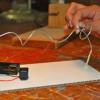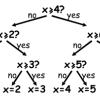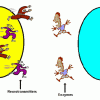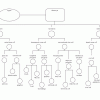Search Results
Showing results 1 to 20 of 141

Number Sense and Computation: Money Counts
Source Institutions
In this math lesson, learners count and compare amounts of money less than or equal to one dollar.

Circuit Game
Source Institutions
In this activity, learners build a game that tests their steadiness. Learners construct the game board by setting up an electrical circuit and a wand.

Neurotransmitters Contain Chemicals
Source Institutions
In this activity, learners play a simple card game to learn the sequence of events in the transmission of nervous system signals.

Battleships: Searching Algorithms
Source Institutions
This activity explores the main algorithms that are used as the basis for searching on computers, using different variations on the game of battleships.

Two Washers
Source Institutions
In this activity, learners create a mind and math puzzle that requires a three-dimensional solution.
Message in a Neuron
Source Institutions
In this activity, learners play a simple card game to learn the sequence of events in the transmission of nervous system signals.

Marble Game
Source Institutions
In this activity, learners construct a simple game to test their hand-eye coordination and steadiness of hand.

Twenty Guesses: Information Theory
Source Institutions
This activity introduces the idea that computer scientists measure information by how "surprising" a message is.
Stacking Dice
Source Institutions
In this math game, learners try to earn the most points by winning stacks of four dice. Learners practice number recognition and addition skills.
What's the Difference?
Source Institutions
In this sorting activity, learners play a game in which they try to identify the largest number of differences between two objects.

Saldo Island: An Unfair Game
Source Institutions
In this environmental science activity about biodiversity, learners play a game to discover the effects of non-native species on an ecosystem.

Guess My Number
Source Institutions
In this math activity, learners play a game similar to 20 Questions, in which learners must identify a secret number drawn from a bag.

Synaptic Tag
Source Institutions
In this outdoor activity, learners review the parts of the synapse and their functions by playing a game.

Metamorphosis Matching
Source Institutions
This is an activity where learners will compare the different metamorphosis stages of amphibians.

Whose Fault Is It?
Source Institutions
In this seismic simulation, learners play a "who-dunnit" game to explore earthquakes.

Invent an Animal
Source Institutions
In this outdoor activity and game, learners explore how animals adapt for survival through coloration, markings and camouflage.

The Game of Life: Stem Cell Edition
Source Institutions
In this activity, learners play a game that models what happens as stem cells differentiate into different cell types.

Amazon Water Cycle Roleplay
Source Institutions
In this creative roleplay activity, learners will explore the various processes of the water cycle using movement, sound, and props to aid in comprehension.

Exploring Strange New Worlds
Source Institutions
This fun and simple hands-on astronomy activity lets learners explore model planets (that they or an educator will create), using methods NASA scientists use to explore our Solar System.
Coincidental Colonization
Source Institutions
In this game of chance, learners will discover how organisms colonized the Galápagos Islands, experiencing how chance plays a role in the successful dispersal of species to new areas.
